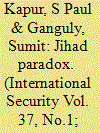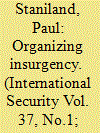|
|
|
Sort Order |
|
|
|
Items / Page
|
|
|
|
|
|
|
| Srl | Item |
| 1 |
ID:
113676


|
|
|
|
|
| Publication |
2012.
|
| Summary/Abstract |
Islamist militants based in Pakistan pose a major threat to regional and international security. Although this problem has only recently received widespread attention, Pakistan has long used militants as strategic tools to compensate for its severe political and material weakness. This use of Islamist militancy has constituted nothing less than a central component of Pakistani grand strategy; supporting jihad has been one of the principal means by which the Pakistani state has sought to produce security for itself. Contrary to the conventional wisdom, the strategy has not been wholly disastrous. Rather, it has achieved important domestic and international successes. Recently, however, Pakistan has begun to suffer from a "jihad paradox": the very conditions that previously made Pakistan's militant policy useful now make it extremely dangerous. Thus, despite its past benefits, the strategy has outlived its utility, and Pakistan will have to abandon it to avoid catastrophe. Other weak states, which may also be tempted to use nonstate actors as strategic tools, should take the Pakistani case as a cautionary lesson.
|
|
|
|
|
|
|
|
|
|
|
|
|
|
|
|
| 2 |
ID:
113677


|
|
|
|
|
| Publication |
2012.
|
| Summary/Abstract |
A central question in civil war research is how state sponsorship, overseas funding, involvement in illicit economics, and access to lootable resources affect the behavior and organization of insurgent groups. Existing research has not arrived at any consensus, as resource wealth is portrayed as a cause of both undisciplined predation and military resilience. A social-institutional theory explains why similar resource wealth can be associated with such different outcomes. The theory argues that the social networks on which insurgent groups are built create different types of organizations with differing abilities to control resource flows. There is no single effect of resource wealth: instead, social and organizational context determines how these groups use available resources. A detailed comparative study of armed groups in the insurgency in Kashmir supports this argument. A number of indigenous Kashmiri insurgent organizations received substantial funding, training, and support from Pakistan from 1988 to 2003, but they varied in their discipline and internal control. Preexisting networks determined how armed organizations were built and how material resources were used. Evidence from other South Asian wars shows that this is a broader pattern. Scholars of civil conflict should therefore explore the social and organizational processes of war in their research.
|
|
|
|
|
|
|
|
|
|
|
|
|
|
|
|
| 3 |
ID:
113675


|
|
|
|
|
| Publication |
2012.
|
| Summary/Abstract |
The reaction of Americans to the terrorist attacks of September 11, 2001, has been massively disproportionate to the actual threat posed by al-Qaida either as an international menace or as an inspiration or model for homegrown amateurs. An examination of the activities of international and domestic terrorist "adversaries" reveals that exaggerations and distortions of the threat have inspired a determined and expensive quest to ferret out, and even to create, the nearly nonexistent. The result has been an ill-conceived and remarkably unreflective effort to react to an event that, however tragic and dramatic in the first instance, should have been seen to be of only limited significance at least after a few years. Not only has the terrorism delusion had significant costs, but the initial alarmed perspective has been so internalized that anxieties about terrorism have persisted for more than a decade despite exceedingly limited evidence that much fear is justified.
|
|
|
|
|
|
|
|
|
|
|
|
|
|
|
|
| 4 |
ID:
113673


|
|
|
|
|
| Publication |
2012.
|
| Summary/Abstract |
Why did violence decline in Iraq in 2007? Many policymakers and scholars credit the "surge," or the program of U.S. reinforcements and doctrinal changes that began in January 2007. Others cite the voluntary insurgent stand-downs of the Sunni Awakening or say that the violence had simply run its course with the end of a wave of sectarian cleansing; still others credit an interaction between the surge and the Awakening. The difference matters for policy and scholarship, yet this debate has not moved from hypothesis to test. An assessment of the competing claims based on recently declassified data on violence at local levels and information gathered from seventy structured interviews with coalition participants finds little support for the cleansing or Awakening theses. Instead, a synergistic interaction between the surge and the Awakening was required for violence to drop as quickly and widely as it did: both were necessary; neither was sufficient. U.S. policy thus played an important role in reducing the violence in Iraq in 2007, but Iraq provides no evidence that similar methods will produce similar results elsewhere without local equivalents of the Sunni Awakening.
|
|
|
|
|
|
|
|
|
|
|
|
|
|
|
|
| 5 |
ID:
113674


|
|
|
|
|
| Publication |
2012.
|
| Summary/Abstract |
When should the United States and other members of the international community intervene to stop a government from harming its own citizens? Since World War II, the main standard for intervention has been the high bar of genocide, although the international community has rarely acted to stop it. The main alternative-the "responsibility to protect"-would set the bar so low that virtually every instance of anarchy or tyranny would create unbounded obligations beyond the capacity of states to fulfill. A new standard-the pragmatic standard of humanitarian intervention-can help guide decisionmakers on when to intervene to stop governments from targeting their own citizens. The standard has three requirements: (1) an ongoing campaign of mass homicide sponsored by the government; (2) a viable plan for intervention with reasonable estimates of low casualties for the intervening forces; and (3) a workable strategy for creating lasting local security for the threatened population. The pragmatic standard was met in the recent successful intervention in Libya as well as in other cases over the last twenty years, and it should become the basis for deciding which humanitarian crises justify international intervention in the future.
|
|
|
|
|
|
|
|
|
|
|
|
|
|
|
|
|
|
|
|
|